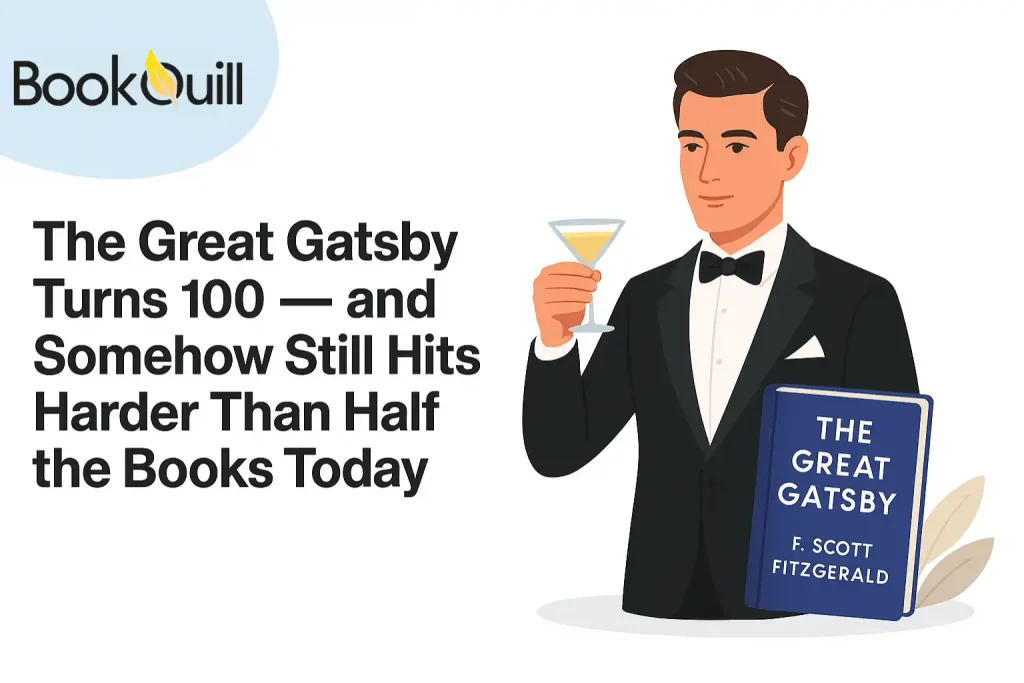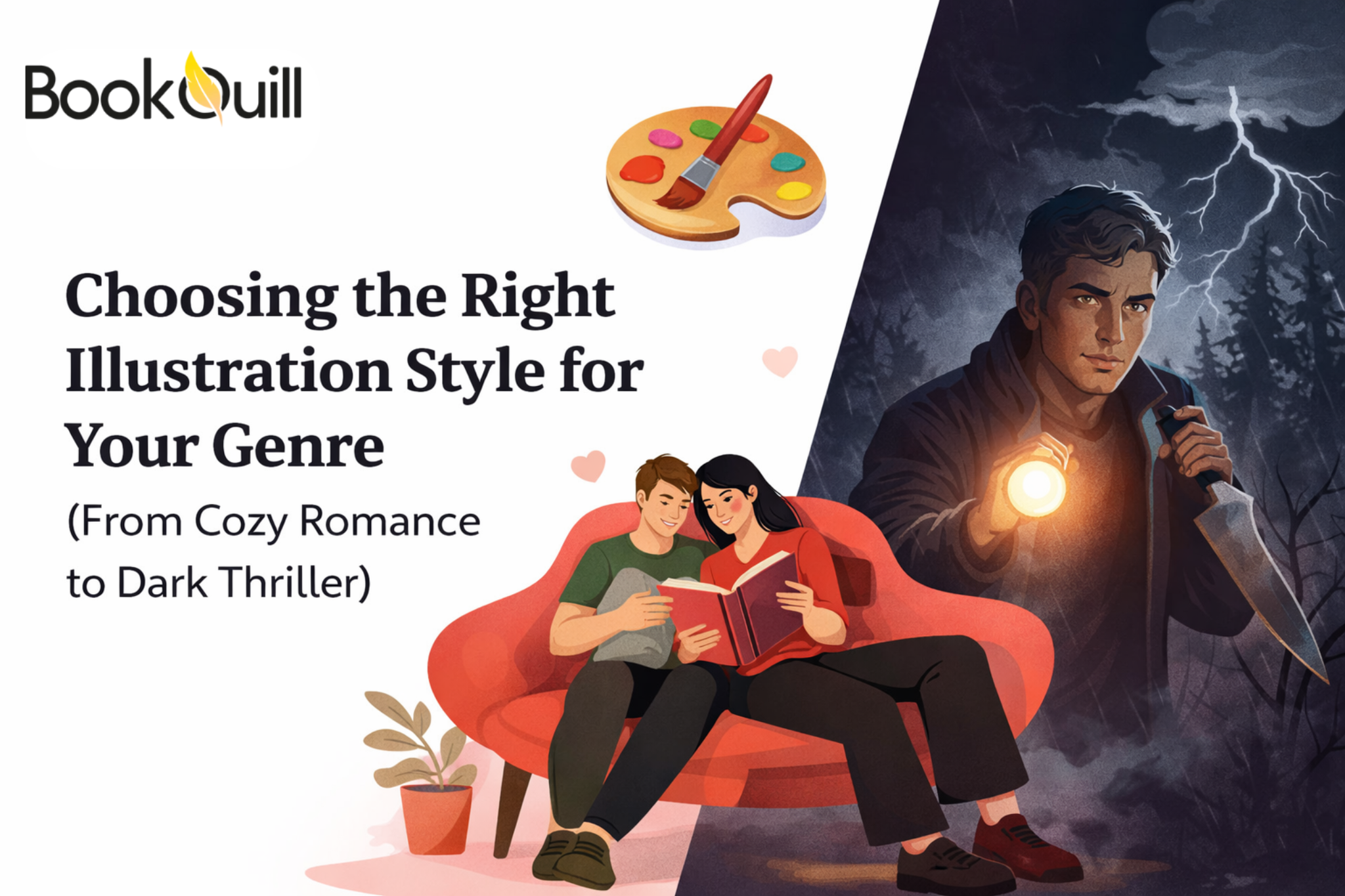Table of Contents
Explore Blogs
Trending on Ebook
The Great Gatsby Turns 100 — and Somehow Still Hits Harder Than Half the Books Today

In 1925, F. Scott Fitzgerald published a novel called “The Great Gatsby.” The book of wild parties, shattered dreams, and madness of the Jazz Age. A book that, at first, seemed as if it would just have its place on the dusty back shelves of literary history.
And yet, here we are, 100 years later, still talking about it, still teaching it, still arguing over it. And somehow, it still hits harder than half the books written today. Why? What is it about this novel that keeps it alive?
After all, new books are flowing in every year, including good fiction books and bad fiction books, but how does “The Great Gatsby” still manage to outshine so many? And let’s not forget that despite its initial failure, only 20,000 copies were sold by the time of Fitzgerald’s death. Soon, “The Great Gatsby” rose from the ashes, becoming one of the greatest works of fiction of all time. Today, it has sold over 25 million copies and has five film adaptations.
In this blog, we will be exploring the magic of Gatsby, exploring why it still hits harder than half the books written today. We will look at the classical themes it presents, the unforgettable characters, the poetic prose, and the harsh truths it uncovers about dreams, love, and the American pursuit of happiness.
Key Takeaways
- Dreams Are Both Beautiful and Dangerous: “The Great Gatsby” shows that dreams can inspire us but also destroy us, making it one of the most unforgettable works of good fiction ever written.
- Authentic Characters Are Flawed and Real: Gatsby, Daisy, and Tom are memorable because they are flawed, just like us.
- Society’s Glitter Often Hides Its Core: The novel’s critique of wealth and status is still relevant, proving that good fiction books don’t just entertain, they reveal truths.
- The Power of Subtle Symbolism: From the “green light” to the “valley of ashes”, The Great Gatsby shows that great stories use symbols to deepen meaning.
- Prose That Feels Like Poetry: Fitzgerald’s lyrical writing is a masterclass in style, a skill that premium ebook writing services can help writers master.
- A Story That Reflects Our World, Even a Century Later: This book is a mirror, revealing our obsession with status, wealth, and dreams.
Why “The Great Gatsby” Remains One of the Best Fiction Books Ever Written
Before we indulge in its core themes, perspectives, and the rich language that makes it unforgettable, let’s first answer some simple questions. So, who wrote The Great Gatsby? It was written by F. Scott Fitzgerald. When was The Great Gatsby written? It was written 100 years ago, in 1925.
We won’t keep you waiting for long, especially after all the praises we have made in the introduction above. So, let’s now talk about what makes this book so great, what these themes are, the iconic characters, the lyrical writings, and the stark realities it reveals.
1. Theme: Love, Ambition, and the American Dream
You can say, “The Great Gatsby” is a story about dreams, both the ones we chase and the illusions we cling to. Fitzgerald captured the obsessive chase of wealth, love, and the subtle American Dream. But unlike many good fiction books that preach or exaggerate, Gatsby’s tale is raw and brutally honest.
If we talk about the themes, Gatsby’s undying love for Daisy, his relentless race for wealth, and his belief in the “green light, “a single green light, minute and far away, are all reflections of our desires today!
Ask yourself, are you any different? Fine, we may not throw lavish parties, but we chase likes, followers, and luxury, the modern green lights of today!
There’s a line in the book that goes, “Gatsby believed in the green light, the orgastic future that year by year recedes before us.” This persistent hope, this refusal to let go of dreams, is something we all understand, even a century later. Don’t you think so?
And that’s what makes it a masterpiece. “The Great Gatsby” remains a mirror, reflecting our hopes, flaws, and obsessions. It’s a story of how dreams can uplift us but also destroy us.
2. Complex Characters That Feel Real
Jay Gatsby. Daisy Buchanan. Nick Carraway. Tom Buchanan. These names are engraved in literary history, not because they are heroes, but because they are so vividly flawed and real.
Gatsby is both a hopeless romantic and a cruel businessman, a man who believes “you can’t repeat the past,” yet spends his life trying to do just that. The irony!
Daisy is both charming and cruel. Her voice was described as being “full of money.” Tom is powerful and insecure, a man who hides his fears behind arrogance.
Did you find these characters odd? Well, that’s because Fitzgerald didn’t create perfect characters. He created human beings, flawed, selfish, and sometimes tragic. Even Nick, the narrator, is not just an observer. He’s a part of the story, too.
So, why do so many modern books fail here? Often, because they focus on predictable character sketches, the perfect hero, and the evil villain. But “The Great Gatsby” shows that true good fiction books hold complexity.
And then there’s the ending! Surely, Fitzgerald was a genius who knew how to end a novel. Through a tragic, poetic finale where Gatsby’s dream crumbles, and Nick’s somber words, “So we beat on, boats against the current, borne back ceaselessly into the past.”
3. A Critique of Society That Still Stings
“The Great Gatsby” is not just a love story. It’s an agonizing analysis of society. Fitzgerald didn’t just write about wealth; he exposed its hollow core.
From the parties at Gatsby’s mansion, “Men and girls came and went like moths among the whisperings and the champagne and the stars”, to the brutal realities of Tom and Daisy’s careless lives, the novel reveals the emptiness of chasing luxury.
But a century later, we are still caught in the same endless pursuit. In our age of influencers and social media, are we not still looking for our own “green lights”? Do we not measure success in followers, wealth, and status?
Fitzgerald’s ability to capture society’s obsession with wealth and status is unmatched. It’s a reminder that good fiction books don’t just entertain, they make us question our world.
And for those who dream of writing impactful stories, understanding social critique is essential. We suggest seeking premium book writing help if you want to turn your good idea into a masterpiece like this.
4. The Power of Poetic Prose That Stays with You
Ever heard someone say something so profound that it stops you in your tracks? A line so perfectly spoken or written, so undeniably true, that it hits you like a revelation and stays in your mind forever?
One of the greatest charms of “The Great Gatsby” is its unforgettable prose. Every line struck you with a blow, as Fitzgerald’s writing is lyrical, almost poetic, yet devastatingly clear.
Consider the beauty of lines like:
“I was within and without, simultaneously enchanted and repelled by the inexhaustible variety of life.”
Or the haunting simplicity of:
“They were careless people, Tom and Daisy, they smashed up things and creatures and then retreated back into their money or their vast carelessness.”
Fitzgerald’s language makes even the simplest scenes feel alive, painting emotions in ways that hit harder than dry, lifeless descriptions in many modern books.
Aspiring authors can learn a lot from his style, but mastering such prose is a skill, one that affordable ebook writing services can help with. Remember, beautiful language is about precision and passion.
If you have a story but struggle to find the right words, it’s better to seek out professionals like BookQuill, who can turn your ideas into masterpieces.
5. Adaptations, Cultural Impact, and Modern Relevance
We can say by now that “The Great Gatsby” is not just a book but a cultural phenomenon. From the iconic 2013 film starring Leonardo DiCaprio to countless adaptations, references, and memes, Gatsby’s green light has never stopped shining.
Why? Because good fiction books leave a legacy. They continue to inspire, incite, and entertain, even as the world changes.
Today, readers still connect with Gatsby’s tragic ambition, and writers still draw inspiration from Fitzgerald’s storytelling.
Are you the one who dreams of creating your own stories? Start your journey today with the help of the best book-writing help services.
6. Inspires Readers to Dream
The green light in the book is the symbol of hope, ambition, and the unreachable dream.
To Gatsby, the green light is a promise, a dream he can almost touch but never truly grasp. It represents his love for Daisy, but it is also a symbol of the American Dream itself, a dream that is always just out of reach.
However, the green light is not just Gatsby’s dream; it is ours too. It is the dream we all chase, the hope that drives us forward.
Why “The Great Gatsby” Still Hits Harder Than Half the Books Today
Coming back to our question, how does this book hit harder than half of the books written today? Well, the answer is quite simple, because of its themes, characters, prose, and social critique.
Unlike many modern novels that prioritize shock value, “The Great Gatsby” is a slow burn, a story that grows with you over time. It’s heartbreak, it’s tragedy, and it’s poetic beauty that stay with you long after you have turned the last page.
Many modern books may have flashy plots, but they often lack the depth that makes a book unforgettable. For aspiring authors, creating such depth is a challenge, but it’s achievable with the best book writing help services.
Remember, if you dream of writing a book that leaves a lasting impact, you don’t just need an idea. You actually need the right guidance, the right words, and the right vision.
So, will your story be another forgettable read? Or will it be the next Great Gatsby?
Lessons from “The Great Gatsby” for Modern Writers
For nearly a century, this book has been a masterpiece in storytelling. But what exactly makes it such a powerful novel? And what can aspiring writers learn from it?
1. Show, Don’t Tell
Fitzgerald never tells us that Gatsby is in love with Daisy; he shows us. We see it in his extravagant parties, in his nervousness before meeting her, and in the way he watches the green light across the bay.
Aspiring authors should learn to trust their readers, allowing emotions and themes to reveal naturally. For those struggling with this technique, premium book writing help can provide the guidance needed to master the art of storytelling.
2. Create Flawed Characters
No one in “The Great Gatsby” is perfect. Gatsby is a romantic dreamer but also a fraud. Daisy is beautiful but shallow. Tom is powerful but insecure. Even Nick, the narrator, is not entirely reliable.
Flawed characters are relatable because they are real. Modern writers often create one-dimensional heroes and villains, but great stories are filled with characters who are both good and bad, just like real people.
3. Use Symbolism Wisely
This book is filled with symbols that deepen its meaning. But these symbols are never forced. They feel natural, growing out of the story itself. Aspiring authors should learn to use symbolism in the same way.
4. Write Prose That Feels Like Poetry
Fitzgerald’s writing is known for its lyrical beauty. Lines like “Reserving judgments is a matter of infinite hope” are unforgettable because they capture complex emotions in just a few words.
Modern writers often focus too much on dialogue or action, forgetting that prose itself can be a powerful tool.
5. Embrace Tragedy
The Great Gatsby is not a happy story, but that is what makes it unforgettable. Modern novels often shy away from sadness, offering neat, happy endings. But tragedy can be powerful if done well.
Writers should not be afraid to explore dark themes, to show that dreams can crumble, and that love can become an illusion.
Frequently Asked Questions
Why is “The Great Gatsby” Considered the best fiction book?
The Great Gatsby is celebrated for its everlasting themes of love, ambition, and the American Dream, along with its complex characters and poetic prose.
When Was The Great Gatsby Written, And Who Wrote The Great Gatsby?
The Great Gatsby was written by F. Scott Fitzgerald and published in 1925, becoming a masterpiece that still resonates with readers today.
What Makes The Characters In The Great Gatsby So Unforgettable?
That’s because the characters, Gatsby, Daisy, and Tom, are complex, flawed, and relatable, a lesson for aspiring writers seeking Custom book writing help.
How Does The Great Gatsby Use Symbolism?
From the iconic “green light” to the “valley of ashes”, the novel’s symbols add depth to its narrative.
What Can Aspiring Writers Learn From “The Great Gatsby?”
This book teaches writers how to create amazing characters, use symbolism, and use poetic prose.
About Author
Hi My name is Micheal Adams, When I am not watching horror movies and helping my kids with homework or reading my favorite fantasy/supernatural novels – I’m writing to guide aspiring authors. I focus on exploring and simplifying both the technical aspects and the often-overlooked details of book writing and publishing so I can empower new writers to climb the Amazon bestseller list and connect with more readers.




